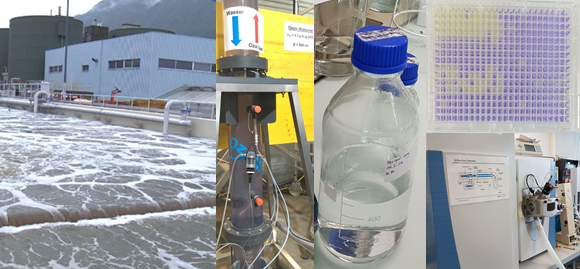Department Environmental Chemistry
SWO3T: Bioanalytical Strategies for Evaluating Wastewater Ozonation Treatment

Ozonation is one of the treatments used in wastewater treatment plants (WWTPs) to remove micropollutants, reducing their discharge to the aquatic environment. However, this chemical process leads to the formation of ozonation transformation products (OTPs) and byproducts (OBPs), among which some are potentially toxic. Accordingly, a better understanding of the chemistry of reactions taking place in ozonated wastewater as well as the identification of precursors and factors which may lead to or favor the formation of toxic OTPs and/or OBPs is required. This is especially relevant for WWTPs receiving considerable industrial inputs, where the profile of precursors and hence of the formed OTPs and OBPs, could be different from those encountered in WWTPs without industrial inputs, engendering stronger toxicological concerns.
The main objectives of this project are to develop and apply a bioanalytical strategy based on effect-directed analysis, which combines toxicological and chemical analysis, to identify potentially toxic compounds formed during the ozonation of wastewater. Toxicological assays with endpoints relevant to human health and the environment (such as mutagenesis) and advanced chemical analysis based on cutting-edge high-resolution mass spectrometry (targeted, suspect, and non-targeted analysis) will be used to further understand the ozonation of wastewater. Furthermore, mechanistic investigations will be performed to uncover the formation pathways of problematic OTPs/OBPs and determine conditions that could mitigate or accentuate their formation. Such a multidisciplinary approach will broaden our knowledge regarding the use of ozonation in wastewater treatment. The gained knowledge will contribute to the optimization of enhanced wastewater treatment.
